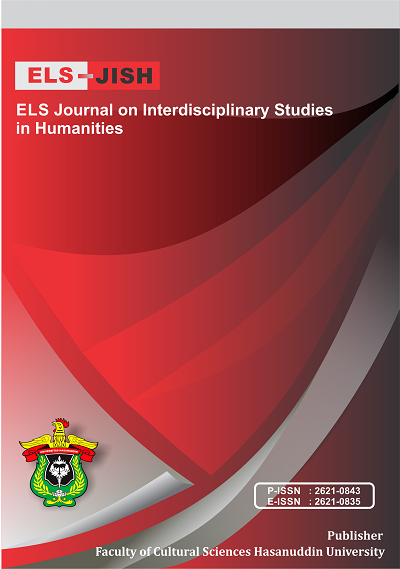An Analysis of Buginese Students in Pronouncing English Consonants: A Case Study at English Department Hasanuddin University
DOI:
https://doi.org/10.34050/elsjish.v7i1.32994Keywords:
Cause of Pronunciation Improperly, Pronunciation Improperly, Troubled English ConsonantsAbstract
The aims of this study are: (1) to identify kind of English consonants that are pronounced improperly by Buginese students, and (2) to find out the factors that cause Buginese students in pronouncing English consonants improperly. The method used in this research is descriptive qualitative method. This research is carried out on the Buginese students of English Department of Hasanuddin University batch 2016. The data is obtained by conducting pronunciation test and giving questionnaires. The data is analyzed by identifying the problematic consonants and revealing the factors that caused Buginese students pronounce English consonants improperly. The findings show that the troubled English consonants tend to come from the presence of consonants in English which are not exist in Buginese language such as /θ/, /ð/, /ʃ/, and /tʃ/, the difficulty in distinguishing voiced and voiceless consonants as in /v/ and /z/ sound, and the difficulties related to substitution, omission, and insertion of consonants found in past participle and in plural form. Meanwhile, the causes of the pronunciation problems by Buginese students consist of three causes, namely: the influenced of their mother tongue (Buginese), the period when they start to learn English, and lack of motivation and efforts to make their pronunciation better.
References
Amoah, S., & Yeboah, J. (2021). The speaking difficulties of Chinese EFL learners and their motivation towards speaking the English language. Journal of Language and Linguistic Studies, 17(1), 56-69.
Anggawirya, A. M., Prihandoko, L. A., & Rahman, F. (2021). Teacher’s Role on Teaching English during Pandemic in a Blended Classroom. In International Joined Conference on Social Science (ICSS 2021) (pp. 458-463). Atlantis Press.
Aswad, M., Rahman, F., Said, I. M., Hamuddin, B., & Nurchalis, N. F. (2019). A software to increase English learning outcomes: An acceleration model of English as the second language. The Asian EFL Journal, 26(6.2), 157.
Guo, Q., Zhou, X. E., & Gao, X. A. (2021). Research on learning and teaching of languages other than English in System. System, 100, 102541.
Harun, L. B., Mujiyanto, J., & Faridi, A. (2019). The Effect of Buginese Language Transfer on Students’ English Pronunciation: A Case Study at SMAN 4 Barru. English Education Journal, 9(3), 334-341.
Hui, S. M., & Yunus, M. M. (2023). Revisiting Communicative Language Teaching Approach in Teaching ESL Speaking Skills. Journal of Language Teaching and Research, 14(6), 1515-1523.
Kehing, K. L., & Yunus, M. M. (2021). A Systematic Review on Language Learning Strategies for Speaking Skills in a New Learning Environment. European Journal of Educational Research, 10(4), 2055-2065.
Kobilova, N. R. (2022). Importance of pronunciation in english language communication. Academic research in educational sciences, 3(6), 592-597.
Le, T. S. (2022). Investigating Pronunciation Difficulties and Preference for Pronunciation Instruction. European Journal of Foreign Language Teaching, 6(2).
Lingga, L. M., Simanjuntak, R. M., & Sembiring, Y. (2020). Students’ strategies in learning speaking skills at SMP Nasrani 3 Medan. Journal of Languages and Language Teaching, 8(1), 91-99.
Liu, J., Hu, S., & Pascarella, E. T. (2021). Are non-native English speaking students disadvantaged in college experiences and cognitive outcomes?. Journal of Diversity in Higher Education, 14(3), 398.
Maswani, M., Machmoed, H. A., & Sahib, H. (2021). Mispronunciations Among the Pattinjo Native Students of English at the Universities in Makassar. International Journal of Innovations in Engineering Research and Technology, 8(11), 1-6.
Prihandoko, L. A., Tembang, Y., Marpaung, D. N., & Rahman, F. (2019). English language competence for tourism sector in supporting socio-economic development in Merauke: A Survey Study. In IOP Conference Series: Earth and Environmental Science (Vol. 343, No. 1, p. 012170). IOP Publishing.
Rahman, F. (2018). The Constraints of Foreign Learners in Reading English Literary Works: A Case Study at Hasanuddin University. Journal of Arts and Humanities, 7(2), 01-12.
Said, M. M., Rita, F., Weda, S., & Rahman, F. (2021). English Language Performance Development Through Extracurricular Activities At Faculty Of Teacher Training And Education Tadulako University Palu. PalArch's Journal of Archaeology of Egypt/Egyptology, 18(08), 388-403.
Sahib, H., Hanafiah, W., Aswad, M., Yassi, A. H., & Mashhadi, F. (2021). Syntactic Configuration of Code-Switching between Indonesian and English: Another Perspective on Code-Switching Phenomena. Education Research International, 2021, 1-10.
Sahib, H., Hanafiah, W., Aswad, M., Yassi, A. H., & Mashhadi, F. (2021). Research Article Syntactic Configuration of Code-Switching between Indonesian and English: Another Perspective on Code-Switching Phenomena. Education Research International, Hindawi Education Research International.
Sukmawaty, F. F. R., & Andini, C. (2022). Covid-19 Pandemic and Axiology of Communication: A Study of Linguistic Phenomena. IJISRT, 7(4), 1079-1087.
Terzioğlu, Y., & Kurt, M. (2022). Elevating English Language Learners’ Speaking Fluency and Listening Skill Through a Learning Management System. SAGE Open, 12(2), 21582440221099937.
Tram, H. T. A. (2020). Problems of learning speaking skills encountered by English major students at Ba Ria-Vung Tau university, Vietnam. European Journal of English Language Teaching, 5(4).
Tsang, A. (2022). The relationships between EFL learners’ anxiety in oral presentations, self-perceived pronunciation, and speaking proficiency. Language Teaching Research, 13621688221102522.
Winnie, W., Leong, H. J., Badiozaman, I. F., & Yap, A. (2023). Negotiating the challenges in speaking English for Indonesian undergraduate students in an ESL university. Studies in English Language and Education, 10(2), 16.
Yapp, D., de Graaff, R., & van den Bergh, H. (2023). Effects of reading strategy instruction in English as a second language on students’ academic reading comprehension. Language Teaching Research, 27(6), 1456-1479.
Yassi, A. H., Hanafiah, W., Sahib, H., Aswad, M., Nurchalis, N. F., & Azizi, Z. (2023). Exploring the effects of Pair-Interaction Model on improving Indonesian adult learners’ English proficiency. Studies in English Language and Education, 10(1), 117-136.
Downloads
Published
How to Cite
Issue
Section
License
Copyright (c) 2024 Anggi Anggraeni, Kamsinah Kamsinah, Sukmawaty Sukmawaty

This work is licensed under a Creative Commons Attribution-ShareAlike 4.0 International License.






